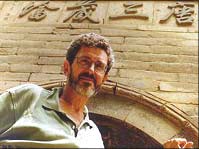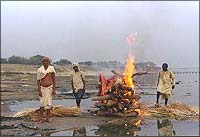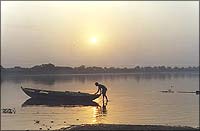The Rediff US Special/ Arun Kristian Das
Down The Road With Huien Tsang

|
|
Richard Bernstein at the pagoda marking Huien Tsang's grave in Xian
| |
Not too long ago, Richard Bernstein was trying to figure out what he could do to "get away from it all".
When he had been a foreign correspondent, he had lived and travelled around the world, but in his more recent role as a New York City-based book critic for the New York Times, he found that he had become "too sedentary and sluggish".
His personal life was "comfortably inert" -- he was in a good relationship with a wonderful woman whom he respected greatly, yet he resisted taking the next step, marriage.
At first, Bernstein wondered if learning to make Shaker furniture at his farmhouse in upstate New York might help him shake the feeling of apprehension that had come over him when he had passed the age of 50, finding himself -- among other things --childless and unmarried.
But ultimately the veteran journalist's sense of adventure prompted him to undertake a journey instead.
"I've always been driven to travel even as I have a somewhat contradictory attitude about it," said Bernstein, now 56, in an interview. "I really do often believe that wisdom lies in staying still and that travel is a futile effort to escape from the reality of existence. And yet I have been driven to travel and to live in faraway countries that are as different as I can find from my own."
The journey he decided to undertake would be a trek across Asia -- something he'd been planning in the back of his mind for many years. Not an ordinary trip, but one with a familiar premise: retracing the path of a famous historical voyager.
It would be a retread of the steps of, in Bernstein's view, history's greatest traveller -- Huien Tsang, a Chinese Buddhist monk who between 629 and 645 CE journeyed from Xian, China, to southern India and back in search of the Truth.

|
|
Bernstein visited a Sikh orphanage in Amritsar. 'There was an atmosphere of nurturing and caring for these boys,' he says. 'And the boys themselves were just so beautiful'
| |
It was, as Bernstein calls it, the 'Ultimate Journey', and like any good journalist and book critic, he knew it would make for great literary material.
The book, Ultimate Journey, the result of his curiosity and vigorous note-taking on the four-month-plus trip, was published by Alfred A Knopf in March.
As a former Time magazine correspondent based in Hong Kong for three years and later that magazine's Beijing bureau chief from 1980 to 1982, Bernstein is no stranger to Asia. Indeed, he is the author of two previous books on China, and had travelled to India before.
While the seventh-century Buddhist monk made his journey on horseback, camelback, elephant-back and foot, Bernstein replicated the journey by airplane, train and jeep.
Bernstein's life journey began on a chicken farm in East Haddam, Connecticut, where his parents, both East European immigrants, raised him and his sister. This was where he "first dreamed about other, more thrilling places".
"Every American has at one time or another seen a photograph of the Taj Mahal and thought 'my god, it would be an amazing thing to go there'," he said. As a Harvard graduate student, Bernstein travelled to Taiwan to learn Chinese and do research for his thesis. There he became a stringer for The Washington Post -- his first job in journalism.
After returning to the United States and working on his thesis for one more year (he never finished it), he was offered a full-time job in 1973 as staff writer for Time.
Bernstein left academia behind for a career as a journalist, reporting from cities like Hong Kong, Beijing and Paris. Years of hard and exciting work were rewarded with the position of literary critic for the Times.
He works in the comfort of his spacious Upper West Side apartment, surrounded by stacks of books. "I live at that rare nexus of political freedom and material profusion wherein you can actually pay the rent sitting at home pronouncing on the quality of other people's writings," he writes in the introduction to Ultimate Journey.
It was a good job, Bernstein said, but one that contributed to his feeling of restlessness. His journey in the footsteps of Huien Tsang, across China and India and back, would provide him with an appreciation for his place in life. He was astonished by much of what he saw.
"One of the elements of India that is most difficult for the Western mind to grapple with is the depth and power of Hindu spirituality," Bernstein said. "It's both troubling and inspiring that so many people who are so poor have time and energy for very, very thorough-going, intense and profound spiritual searches."

|
|
Bernstein hired an old wooden boat rowed by a man named Choonoolal, who took him upriver from Varanasi to Ramnagar. 'On the far shore of the Ganges, we came across the humble funeral pyre of the wife of a man named Shova Yado, milkman,' he says
| |
Bernstein was struck by how Hinduism is so detached from materialistic values. A meeting with the shankaracharya of Kanchipuram, a leading figure of Hinduism, was particularly enlightening. "With his entourage, the kind of conspicuous anti-materialism of it, really kind of brought home to me that Hinduism really is an ascetic religion," he said.
"It is a religion which encourages people to look into themselves for truth as the goal of life rather than to get rich or to acquire power."
As evidence of this, Bernstein compared the shankaracharya of Kanchipuram to the Pope, who, he said, holds a comparable spiritual position in Roman Catholicism. Yet, "their appearance to the world is utterly, utterly different", he said. "One is surrounded by the trappings of splendour -- vast cathedrals and palaces and fabulous museums full of zillion-dollar paintings and sculptures... and all the trappings of power. I couldn't show up in Rome and say 'Gee, could I come and see the Pope?' and be welcomed, but there I was in India, asking if I could meet the shankaracharya of Kanchipuram and I was welcomed."
This was only one of many spiritually illuminating encounters that Bernstein chronicles in the book. He journeyed from China to Afghanistan, Pakistan and into India, where he travelled through many cities, including Delhi, Agra, Bodh Gaya, Calcutta, Madras and all the way to Bombay.
As a self-proclaimed secular, sceptical Jew, Bernstein did not purport to seek Huien Tsang's Ultimate Truth. But his trip was a spiritual one nonetheless.
Unlike Buddhists, "I don't believe in the illusoriness of the self, I believe the self is real," Bernstein said. "I'm not a mind-only metaphysician, but I do believe that true happiness lies in letting go a little of the self, of recognizing that the ferocity of the attachment to ourselves derives from a desire to be happy but actually leads to suffering."

|
|
Choonoolal, Bernstein's guide on the Ganges, and his boat
| |
In the end, Bernstein learnt many things about himself -- enough to help him move forward in his life. His romantic companion, Zhomgmei Li, a Chinese national, accompanied him on parts of his journey, and it helped Bernstein realize that he'd had "enough of this lonely life, enough of this Lone Ranger existence."
Last September, Bernstein and Li married.
While Ultimate Journey has received a fair amount of praise in the United States, to Bernstein's dismay, it was unfavourably reviewed by at least one publication in India.
"Bernstein's aim through his journey is to pay homage to the monk's achievements, but unlike Huien Tsang, he came to India without study.... As a result, he has undermined his credibility with clichés, want of understanding, and dyslexia with Indian names," wrote India Today's critic Gillian Wright.
Bernstein said the negative review was somewhat paradoxical because India Today was the very publication he read during his journey, and from which he drew some of the information used in his book.
Bernstein said he did not want to gloss over the aspects of his Indian experiences that troubled him deeply, like the country's tremendous poverty. The shocker was "not just the poverty of India, but the common indifference to the suffering that was so visible", he said. "And when I say that, I am fully aware that here in New York we step over beggars in the street, too.... But there's just so much more suffering -- it's so much more visible, so much more obvious because there are so many more poor people in India."
Bernstein said his sadness about India's poverty comes simply from his tremendous appreciation of the country and his empathy for its people.
"Maybe it was that in being shocked, sometimes, I appeared to be disdainful of India, but nothing could be farther from the truth," he said. "I'm hugely respectful of this great, colossal, astonishing civilization."
Back to top
Tell us what you think of this feature